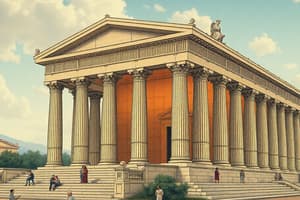Podcast
Questions and Answers
Who could be considered an Athenian citizen in ancient Athens?
Who could be considered an Athenian citizen in ancient Athens?
Male citizen aged over eighteen, whose parents were born in Athens and who had served in the army
Which groups were not considered Athenian citizens in ancient Athens?
Which groups were not considered Athenian citizens in ancient Athens?
- Women
- Foreigners
- Slaves
- All of the above (correct)
What is the definition of democracy in a political system?
What is the definition of democracy in a political system?
- Equal share of power among all members of society (correct)
- Only possible for women, foreigners, and slaves
- Power concentrated in a particular governor or family group
- Limited to voting rights only
Which type of democracy has the head of the state and government officials elected by voters?
Which type of democracy has the head of the state and government officials elected by voters?
What type of democracy involves all citizens participating in decision-making through referendums?
What type of democracy involves all citizens participating in decision-making through referendums?
In which type of democracy is the government appointed by parliamentary representatives?
In which type of democracy is the government appointed by parliamentary representatives?
Which type of democracy has a unique party responsible for the nation's government and restricts freedom of speech and associations?
Which type of democracy has a unique party responsible for the nation's government and restricts freedom of speech and associations?
Which type of democracy is characterized by plurality, tolerance, and respect for other political trends?
Which type of democracy is characterized by plurality, tolerance, and respect for other political trends?
Flashcards are hidden until you start studying
Study Notes
Origins of Democracy
- The term "democracy" was first used in ancient Athens, Greece, in 508 BC.
Definition of Democracy
- Democracy is a political system where all members of a society have an equal share of formal political power.
Athenian Democracy
- Characterized by participation of all citizens in political organs (clergy, magistrates, and courts).
- Each organ exercised various political powers, without concentration on a single governor or family group.
- Indirect democracy, where not all citizens could participate in the city's political life.
Athenian Citizenship
- Reserved for male citizens aged over 18.
- Required that both parents had been born in Athens.
- Required prior military service.
- Excluded women, foreigners, and slaves from holding political positions.
Democracy
- At the turn of the century, there was a need for a more participative governing system, leading to the development of democracy in various ways.
- Athenian democracy is considered the first democracy in the world, but it was not complete as not all citizens had the right to vote.
Types of Democracy
-
Direct Democracy:
- All citizens participate in decision-making directly.
- No president or prime minister; power is exercised through referendums that can change laws.
-
Representative Democracy:
- Head of state and government officials are elected by voters.
- In some countries (e.g., Germany, England), the political party with the majority chooses the head of government.
-
Parliamentary Democracy:
- Government is appointed by parliamentary representatives.
-
Popular Democracy:
- Existed in the abolished USSR and some African countries.
- Freedom of speech is limited; no associations or multi-party systems are accepted.
- A single party is responsible for the nation's government.
-
Christian Democracy:
- Characterized by its plurality in all aspects, opposing monopoly and power concentration.
- Tolerant and respectful of other political trends.
- Moderately conservative and successful in some European countries (e.g., Germany, Italy, Belgium) and Latin America.
Studying That Suits You
Use AI to generate personalized quizzes and flashcards to suit your learning preferences.



